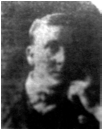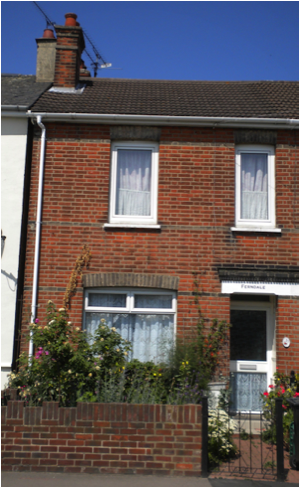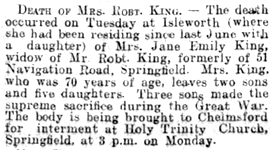George Albert King was born and raised in Chelmsford where he worked for a timber merchants. He married in 1915, a week before being sent to the Front where he was killed in action in October of that year at the Battle of Loos. One of his brothers was also killed during the war. His home was in Navigation Road.
KING, GEORGE ALBERT,
Private, 2nd Battalion, Cheshire Regiment
Just where we are they only have the range of two places or spots. One is a farm building and the other is where the [censored] were entrenched. I may tell you our artillery soon put a stop to their arguments, as they only had about a quarter of an hour at it. When our chaps send the bill back paid, I may tell you there is the interest sent with it, and it amounts to a decent hit. When they killed those [censored], that was a time when they had a lively hour or so. Our boys plonked shell after shell and of every description right bang into their trenches. It was a proper sight to see them exploding, especially the coalboxes.
By gum, they don’t half shift something. I had to poke my loaf of bread over the top of the parapet and have a look when each went over. I may tell you it would never do to put your head up three inches above the top in the firing line as they can hit that much easier. Well, the result of that little bombardment practically ruined a good portion oft the trench; you could plainly see the great gasp in various places.
Just where we are Fritz is only about 40 yards away at the most, and in one place he is only 25 yards. Here on Tuesday, when a sergeant, and a corporal were out in a listening post at this short distance, immediately in front of one of the gaps they shot three German officers. They scored a bull each time, so the officer told us who was watching them from the fire trench. They remained where they fell. It was hard luck, but they say these things must be done: if you don’t kill them they will you. When they start all their guns I bet Fritz will wonder what the devil is the matter – I assure you it’s a terrible feeling which goes through you when you are so near as us to a bombardment of each other’s trenches. When they start that game it’s a sure sign of an attack coming off.
We have had the burly Prussian Guards in front of us since last Friday. Do you know, the artful devils know as soon as we do ourselves when we change and who we are. God knows how they tell; we can tell who they are because they fly their flag in the trench; we don’t. The last time we had the Bavarians. When they are to be relieved by the Prussians they will shout across and tell us (they did last time). They shouted Cheshires, save your ammunition for the Guards, as they will be in by such time” they will tell you just to the hour. We are settled down here living like rabbits in holes in the earth, resting slightly at day and compelled to keep awake at night.
You can bet, mother, if ever I manage to get through this lot all right I’m sure I shall never grumble at any food that is put in front of me, or if the bed hasn’t been shook up for a week or so as I don’t fancy any resting place can be much harder the ground, with only just our waterproof to lie on, and our overcoats to act as the sheet, quilt, and counterpace, all combined in one! The life must make the chaps as hard as doornails.
Roll on for the time for all the trouble to be over for the benefit of everybody, young and old, as there has been quite enough damage done and many poor souls lost. It would open your eyes at home to just have a walk through some of the villages I have been through and look at some of the remains of what were at one time fine houses and other nice buildings. I noticed a house with all one side blown away, with holes in the roof, and a woman still holding on to a part of it that was not touched. It was a little front room on the left side of the door. I guess the poor folk had to leave everything when they were shelled like that, and when they returned this was all that was left for them.
People in old happy England who have not been out here cannot realise what these people have suffered. I must tell you there is not a night goes past but what I spend a half-hour to myself thinking of you all, both in Chelmsford and other places concerned, and say to myself, how nice it must be to sleep like them, and in a nice bed. At such an hour as this, this feeling comes practically over all of is, while the shells are whistling and bursting all around us. We break the monotony sometimes by having a sing-song with the latest variety of choruses. That is how we pass the lonesome nights away. I assure you the days pass practically as quick as the hours do. At times we get in a tangle about what day it is and we have to make inquiries whether its Friday or Tuesday.
Now I must draw to a close. Please gibe my kindest regards to Jack Guard and also Bill Lowestoft and tell them I am quite well and as happy as can be expected; there is only one place to beat this, that is dear old England. Now with best love and wishes to you all, I remain, your affectionate son George.
xxxxxxxxxx
Share these amongst you.
PS – Glad to hear Tom is still safe but I sympathise with his poor pals who have been so unfortunate.’”
George has no known grave and is commemorated on the Loos Memorial at Dud Corner Cemetery, France, some five kilometres north-west of Lens (Panel 49 and 50), on the Civic Centre Memorial, Chelmsford, and on the Springfield Parish Memorial at All Saints’ Church. He was entitled to the Victory, British War and 1915 Star medals.
Robert’s father died in 1917, aged 58.
On 20th September 1918 the Essex County Chronicle included the following in memoriam notice:
“King. - In loving memory of our dear son, Pt. G. A. King, 2nd Cheshires, who was killed at the battle of Loos, Sept, 1915, aged 23 years. He was a native of Springfield.”
In 1918 the register of electors listed his mother alone at 51 Navigation Road. She died in 1930.
George’s brother Thomas William King was killed in action in Palestine in 1917.
131110

George was born in Springfield on 14th July 1889, the son of Robert King and Emily Jane King. George’s father had been born in Deptford, Kent in 1855; his mother in the Limehouse-Shadwell area, London c1857. By 1881 the couple had married and were living in Deptford.
George was christened at Holy Trinity Church in Springfield 18th August 1889.
George’s twelve siblings included: Henry Robert King (born in 1880), Robert John King (1882-1913), Annie King (born in 1885), Alice Maud King (born in 1887), Florence Lizzie King (born on 30th March 1892 and christened at Holy Trinity Church in Springfield on 6th June 1896), Thomas William King (born on 26th
February 1894 and christened at Holy Trinity Church in Springfield on 20th March 1894, died 1917), Ada King (born on 11th March 1896 and christened at Holy Trinity Church in Springfield on 6th June 1896), Frank Albert King (christened at Holy Trinity Church in Springfield on 30th August 1898, died 1899), Allen Francis King (born on 24th October 1900 and christened at Holy Trinity Church in Springfield on 16th February 1901, died 1907), and May King (born in 1902). The first three were born in London, the remainder, in Springfield.
The 1891 census found one year-old George living with his parents and four elder siblings at 11 Chelmer Place, off Springfield Road, Springfield. At the time his father was employed as a labourer (sawyer).
A decade later George, his parents and seven siblings were living at 14 Chelmer Place. George’s father was employed as a coal porter, brother Henry was a wood machinist (sawyer), brother Robert was a railway shunter (goods), while George was an errand boy.

Chelmsford street directories from 1910 and 1913 show George’s father listed at 51 Navigation Road, Springfield. The census of 1911 recorded 21 year-old George boarding with the sawyer George Judd, his wife and their daughter at 3 Chapel Place in Chelmsford. George was a labourer at a timber merchant’s, Brown & Sons.
Two years later George’s brother, Robert, was found drowned in the canal at Springfield Basin, Chelmsford.
George later lived at Great Bricett, Suffolk where he is thought to have married Gertrude L. Wright in the first few months of 1915, a week before going overseas. Having enlisted at Chelmsford he served with the 2nd Battalion of the Cheshire Regiment which had been based in Jubbulpore in India and recalled to England, landing at Devonport on 24th December 1914. The battalion landed at Le Havre on 17th January 1915. George was killed in action on 3rd October 1915, aged 23, while serving as Private 28042.
The Essex County Chronicle of 7th January 1916 carried the following report of his death:
“SPRINGFIELD LAD KILLED – A PATHETIC LAST LETTER
Mr Robert King of Navigation Road, Springfield, Chelmsford has received official intimation that his son Pt G A King 2nd Cheshire Regiment has been killed in
action. Mr King has two other sons on active service. The son now unfortunately killed was 23 years old, and was married a week before he left for the Front. He was well known as a former employee of Messrs. Brown and Son Ltd timber merchants and also as an employee of Mr Cockerton when he lived in Goldlay House.
The following letter was the last received by the parents of the deceased:
‘My dear Mother and Father and Family – Many thanks for the letter I received this morning. I am pleased to hear you are all quite well. I may tell you I am so myself at present. Dear mother we came out of our trenches again last Wednesday night; the [censored] relieved us again; our regiment had only about 15 wounded; none was very serious.
By gum, our artillery have just dropped a few shells of coal boxes, high explosive and shrapnel variety, with a little note attached telling Fritzes to share them equally among them as far as they will go. Sometimes they are not satisfied, and send some back to be exchanged, and don’t they rattle?
We have been in the support trenches again this last time, and I may tell you while Fritz was returning some of his sort last Monday or Tuesday I thought it was too dangerous to be safe, for a while I was writing Auntie’s letter their shells were whistling just over our heads and bursting just to the left of our party, and only about 50 yards to the rear. I was hoping they would; not oblige and drop one or two short for us to on with, and I am pleased to say Providence favoured us. When you hear one of them coming I may tell you the only thing to be done is to make yourself as small as possible under the cover of the sandbags.
Well, during Tuesday afternoon I’m sorry to day one of the shells which Fritz dropped over fell amongst the [censored] lines and killed two poor fellows and injured five more. It’s the worst of them, they don’t pay much respect for our soldiers when they try to kill like that. What do you say?

